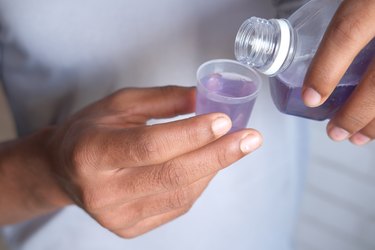
Mouthwash may help prevent cavities, eliminate bacteria and relieve symptoms of dry mouth. But only if you use it correctly.
Here, we spoke with dentist James E. Galati, DDS, vice president of the New York State Dental Association, about five common mouthwash mistakes that may be disrupting your dental health, plus what you can do instead to optimize your oral hygiene.
Video of the Day
Video of the Day
Tip
It's worth noting that not all dentists recommend using mouthwash. If you're unsure whether it should be part of your oral care routine, talk to your dentist about the benefits and risks based on your health status and goals.
Mistake 1: You Use Mouthwash Right After You Brush
If you rinse with certain types of mouthwash seconds after you brush, you're doing your teeth a disservice. That's because you risk flushing away the fluoride from your toothpaste, according to the National Health Service.
Yep, antiseptic rinses (used for healthier gums) will dilute the effects of the fluoride in your toothpaste, Dr. Galati says. Which is not great, because fluoride is fundamental for strengthening your teeth and preventing cavities.
Fix it: When using an antiseptic mouthwash, rinse after meals and before brushing, Dr. Galati says. (By the way, you should be flossing before you brush, too.)
With fluoridated mouthwashes (used to help curb cavities), it’s best to swish soon after flossing and brushing. This allows the fluoride in the rinse to coat the cleaned teeth, Dr. Galati says. To really help fluoride work its wonders, don’t eat or drink anything for at least 30 minutes post-rinse, he adds.
If you need help determining which mouthwash is best for you, have a chat with your dentist.
Mistake 2: You Choose the Wrong Mouthwash
Not all mouthwashes are made the same, literally. Mouthwashes can contain varying active ingredients, and some of these elements may not be suitable for certain people.
For example, antiseptic mouthwashes with alcohol tend to dehydrate the mouth, Dr. Galati says. So if you have a condition like dry mouth or ulcerated or inflamed tissue in the mouth, swishing with alcohol-based rinses isn't recommended because they might worsen the problem, he says.
What's more, mouthwashes containing alcohol may be contraindicated for people in recovery for alcohol abuse, as the alcohol content may trigger a relapse, Dr. Galati adds.
Fix it: Here's where it's key to speak with your dentist, who may suggest specific mouthwashes based on your underlying problem or health history.
Mistake 3: You Use Mouthwash Instead of Brushing
When you're too busy to brush, you might think a quick swig of mouthwash will suffice. But read our lips: Mouthwash is not a substitute for daily brushing and flossing.
Mouthwash only eliminates some plaque. That means you still need to brush to "mechanically and physically remove the plaque and food debris for optimum teeth and gum health," Dr. Galati says.
Fix it: Don't think of swishing mouthwash as a replacement for other oral hygiene habits. Rather, if you want to use it, it should be an additional tool in your daily dental care routine, which should also include brushing twice a day and flossing at least once per day.
Mistake 4: You Use Mouthwash to Treat Chronic Bad Breath
We've all leaned on mouthwash to mask bad breath after a tuna sandwich or garlic bread. While it's OK to use it for a quick, temporary fix now and again, you shouldn't rely on mouth rinses to treat chronic bad breath.
Here's why: Many other health-related factors — from various medications to bacterial tongue coatings and gum disease — can play a role in causing chronic bad breath (also known as halitosis), Dr. Galati says. In some cases, halitosis may also be a sign of gastric reflux, diabetes, liver or kidney disease, per the American Dental Association.
Mouth rinses won't resolve these underlying conditions; they simply disguise the symptoms. But left unchecked, these dental and medical issues can become dangerous.
Fix it: If you struggle with persistent bad breath, see your dentist, who can help you get to the root of the problem by making a proper diagnosis or referring you to another appropriate health care professional.
Mistake 5: You Use Mouthwash More Than Twice a Day
You know what they say about too much of a good thing? Well, this saying applies to mouthwash, too.
"Overuse of alcohol-containing mouthwashes may cause the mouth to dry out, causing tissue irritation and promoting plaque buildup," Dr. Galati says. And plaque can lead to cavities and gum disease.
Simply put: Rinsing too much counteracts your oral hygiene efforts.
Fix it: If you want to use mouthwash, stick to a maximum of two swish-and-swirls daily: once in the morning and once at night.
Is this an emergency? If you are experiencing serious medical symptoms, please see the National Library of Medicine’s list of signs you need emergency medical attention or call 911.